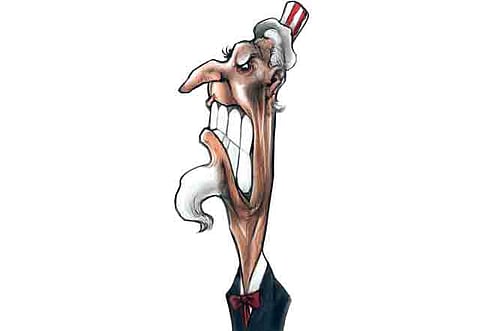Western policies need to change
Muslims would be less likely to strike out if they weren't oppressed

For years now, especially since the September 11 attacks on the US, Americans — both the public and elite — have been trying to figure out why Arabs hate them. While the answer to this question is as simple as anyone could imagine, we Arabs find it extremely difficult to understand why some westerners hate us.
Many objective Americans would certainly admit that the hatred and resentment towards the US is based on political, not cultural grounds, i.e. American policies in Iraq, Palestine and other parts of the region. Many others would tend, however, to twist the facts by claiming that the resentment in the Arab world towards the US is based on envy because Americans are strong, prosperous, democratic and free.
Why do some westerners hate Arabs and Muslims? After all, Arabs did not colonise the West, they did not transform it into a field from which to extract raw materials and a marketplace for manufactured goods, and did not stand in the way of its progress and modernisation. Currently, Arabs are on the periphery of world politics. They are weak, relatively poor and their countries are underdeveloped. Hence, they cannot constitute a threat or pose a challenge to the US and its allies. Besides, while we believe that it is perfectly logical and completely natural that the oppressed may hate their oppressors, we find it extremely difficult to understand why the oppressors hate their victims.
In order to make the case clearer, let's look at examples in which genuine hatred towards Arabs and Muslims has been expressed.
In 2002, the year before he became US deputy undersecretary of defence for intelligence, General William Boykin told an Oregon religious group that the "war on terrorism" is a conflict between Judeo-Christian values and Satan. This "spiritual enemy," he said, "will only be defeated if we come against them in the name of Jesus". In a previous speech, he told an audience in Florida that a Muslim Somali warlord was captured because "I knew my God was bigger than his. I knew that my God was a real God and his was an idol". Instead of reprimanding the general for his foolish remarks, then Secretary of Defence Donald Rumsfeld excused him, telling reporters that "it doesn't look like any rules were broken". "There are a lot of things that are said by people in military or civilian life … that are their views. And that's the way we live. We're a free people. And that's the wonderful thing about our country," Rumsfeld said.
During the war on Iraq, Robert Kilroy-Silk, a BBC presenter and former Labour MP, wrote a provocative article in the Sunday Express in which he questioned the very importance of Arab existence in the stream of human history. "Apart from oil — which was discovered, is produced and is paid for by the West — what do they contribute? Can you think of anything? Anything really useful? Anything really valuable? Something we really need, could not do without? No, nor can I," Kilroy-Silk argued. Despite these racist remarks, many British politicians rushed to defend Kilroy in the name of freedom of expression.
Professor of hate
The third example is related to Daniel Pipes, the true professor of hate in America's academic life. For over 20 years, Pipes has been propagating the idea that Islam is a threat to the West. After 9/11, he established Campus Watch, a website dedicated to revealing the alleged "bias of Middle East studies programmes at US universities" by encouraging students to supply information about their own professors. A key victim of Campus Watch's witch hunt was Dr Rashid Khalidi, a prominent Arab scholar at Columbia University. Dr Khalidi became the target of an intimidation campaign that questioned his patriotism because he opposed the war in Iraq and made sympathetic remarks about the Palestinians. As a result, Dr Khalidi and fellow Arab academics received hundreds of abusive emails and calls, including one denouncing them as "stinking, terrorist Muslim ... ". Despite Pipes' overt cultural hatred and divisive personality, former president George W. Bush rewarded him by appointing him to the board of directors of the US Institute of Peace, a government-funded think tank in Washington.
These examples — and there are many others — show that while Arab resentment towards the US is based on political grounds, the hatred for Arabs in some parts of the western world is based on cultural grounds. The difference between the two is that whereas the former can be tackled by addressing its causes, the latter is dogmatic and can only be addressed by changing a whole culture. Changing western policies is the much easier option.
Dr Marwan Al Kabalan is a lecturer in media and international relations at Damascus University's Faculty of Political Science and Media in Syria.
Sign up for the Daily Briefing
Get the latest news and updates straight to your inbox



